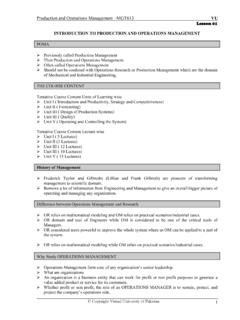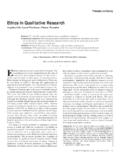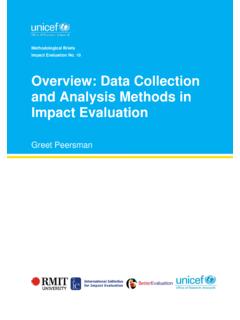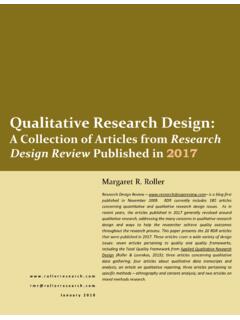Transcription of Comparison of Quantitative and Qualitative Research ...
1 Comparison of Quantitative and QualitativeResearch Traditions: epistemological, theoretical,and methodological differencesKaya YilmazIntroductionEducational researchers in every discipline need to be cognisant of alternativeresearch traditions to make decisions about which method to use when embarkingon a Research are two major approaches to Research that can be usedin the study of the social and the individual world. These are Quantitative andqualitative there are books on Research methods that discuss thedifferences between alternative approaches, it is rare to find an article that exam-ines the design issues at the intersection of the Quantitative and Qualitative dividebased on eminent Research literature. The purpose of this article is to explain themajor differences between the two Research paradigms by comparing them interms of their epistemological, theoretical, and methodological Quantitative Research has well-established strategies and methods but quali-tative Research is still growing and becoming more differentiated in methodologicalapproaches, greater consideration will be given to the of the TermsWhat is Quantitative Research ?
2 It can be defined as Research that explains phenom-ena according to numerical data which are analysed by means of mathematically-based methods, especially statistics. From a broader perspective, it can be definedas a type of empirical Research into a social phenomenon or human problem,testing a theory consisting of variables which are measured with numbers andanalysed with statistics in order to determine if the theory explains or predictsphenomena of interest (Creswell, 1994; Gay & Airasian, 2000).What is qualitativeresearch? Although it is deemed difficult to define because of its multifacetednature underpinned by different paradigms (Hitchcock & Hughes, 1995, p. 26), aworking definition has been provided by some researchers. Strauss and Corbin(1998) offer this definition: By the term Qualitative Research we mean any typeof Research that produces findings not arrived at by statistical procedures or othermeans of quantification (pp.)
3 10 11). But this definition is simplistic since itfocuses on procedures and techniques used to collect and analyse data, ignoringother aspects of Research design . It also tends to define the term from a quantitativeperspective rather than focus on its characteristics. Gay and Airasian (2000, p. 627)define Qualitative Research as the collection of extensive data on many variablesover an extended period of time, in a naturalistic setting, in order to gain insightsnot possible using other types of Research . But this definition also suffers from anidentical problem, since it uses a Quantitative concept to define a Qualitative term( Qualitative Research is based on the epistemological assumption that social phe-nomena are so complex and interwoven that they cannot be reduced to isolatedvariables, so it is not appropriate to use the term variable when defining qualitativebs_bs_bannerEuropean Journal of Education, Vol.
4 48, No. 2, 2013 2013 John Wiley & Sons Ltdresearch). Hence, Qualitative Research needs to be comprehensively defined to dojustice to its key characteristics. Drawing on the Research literature (Creswell,2007, p. 37; Denzin & Lincoln, 1998, 2005, p. 3; Miles & Huberman, 1994,pp. 6 7; Patton, 2002, pp. 39 41), I define it as an emergent, inductive, interpretiveand naturalistic approach to the study of people, cases, phenomena, social situa-tions and processes in their natural settings in order to reveal in descriptive termsthe meanings that people attach to their experiences of the should be noted that Qualitative Research is not based on a single method-ology and does not belong to a single discipline (Denzin & Lincoln, 2005). It draws on philosophical ideas in phenomenology, symbolic interactionism, herme-neutics and other traditions to support the attention on quality rather than quantity.
5 (Brewer, 2003, p. 239).Therefore, the term is used as an overarchingcategory, covering a wide range of approaches and methods found within differentresearch disciplines (Snape & Spencer, 2003, p. 3). There is a wide variety oftheoretical paradigms, methodologies, Research strategies and methods in qualita-tive Research traditions, ranging from descriptive study, case study, field Research ,ethnography, participant observation, biographical method, life history, oralhistory, narrative inquiry to phenomenological Research , ethno-methodology, sym-bolic interactionist study, grounded theory and action between the Two Research ParadigmsWhen the characteristics of Quantitative or Qualitative Research are discussed, thefour essential elements of the Research process must be addressed.
6 They areepistemology, theoretical perspectives, methodology, and methods (Crotty, 1998).Denzin and Lincoln (1998) suggested that four basic issues structure the design ofa Research study: (a) Which paradigm or worldview will inform the study design ?(b)Who or what will be studied? (c)Which Research strategies will be used? and (d)Which Research methods or tools will be used to collect and analyse data? Thisarticle takes into account these components when explaining the differencesbetween Quantitative and Qualitative Research and Qualitative Research designs differ in terms of their epistemo-logical, theoretical and methodological underpinnings. Quantitative Research isinformed by objectivist epistemology and thus seeks to develop explanatory univer-sal laws in social behaviours by statistically measuring what it assumes to be a staticreality.
7 It emphasises the measurement and analysis of causal relationships betweenisolated variables within a framework which is value-free,logical,reductionistic,anddet erministic, based ona Quantitative approach endorses the viewthat psychological and social phenomena have an objective reality that is independ-ent of the subjects being studied, the knower or the researcher and the known orsubjects are viewed as relatively separate and independent. Hence, reality should bestudied objectively by the researchers who should put a distance between themselvesand what is being studied. On the other hand, Qualitative Research is based on aconstructivist epistemology and explores what it assumes to be a socially con-structeddynamicrealitythroughaframew orkwhichisvalue-laden,flexible,descrip-t ive, holistic, and context sensitive; an in-depth description of the phenomenonfrom the perspectives of the people involved.
8 It tries to understand how socialexperience is created and given meaning. From a Qualitative perspective, reality orknowledge are socially and psychologically Qualitative paradigmviews the relationship between the knower and the known as inextricably Journal of Education, Part II 2013 John Wiley & Sons LtdTherefore, the researcher is supposed to develop a close, empathic relationship withthe subjects being studied (Bergman, 2008; Bryman, 1988; Cohen, Manion &Marrison, 2007; Creswell, 2007; Denzin & Lincoln, 1998; Gelo, Braakmann &Benetka,2008;Patton,2002).The epistemological,theoretical,and methodologicaldifferences between Quantitative and Qualitative Research designs, together withtheir underlying assumptions, purposes, approaches and the researcher s roles aresummarised inTable methods require the researcher to use a pre-constructed stand-ardised instrument or pre-determined response categories into which the partici-pants varying perspectives and experiences are expected to fit.
9 They generallydemand randomly selected large representative samples in order for researchers togeneralise their findings from the sample, from where the logic and power ofprobability sampling derive their purpose, generalisation. The major advantageof this method is that it allows one to measure the responses of a number ofparticipants to a limited set of questions, thereby facilitating Comparison andstatistical aggregation of the results of closed-ended questionnaires helpthe researchers to identify a general pattern of participants reactions to a treat-ment or programme. Quantitative methods and procedures allow the researchersto obtain a broad and generalisable set of findings and present them succinctly andparsimoniously. But, because they require a deductive approach and predeter-mined sets of standardised responses based on theory, they fail to provide insightinto the participants individual or personal experiences.
10 They do not let therespondents describe their feelings, thoughts, frames of reference, and experienceswith their own words. Quantitative researchers are supposed to play a neutral rolein the Research process. Hence, the meaning participants ascribe to the phenom-enon studied is largely ignored in Quantitative studies (Patton, 2002).Unlike Quantitative studies which are concerned with outcomes, generalisation,prediction, and cause-effect relationships through deductive reasoning, qualitativestudies are concerned with process, context, interpretation, meaning or under-standing through inductive aim is to describe and understand thephenomenon studied by capturing and communicating participants experiencesin their own words via observation and interview.
















